将定语从句转换为简单句
定语从句转译法
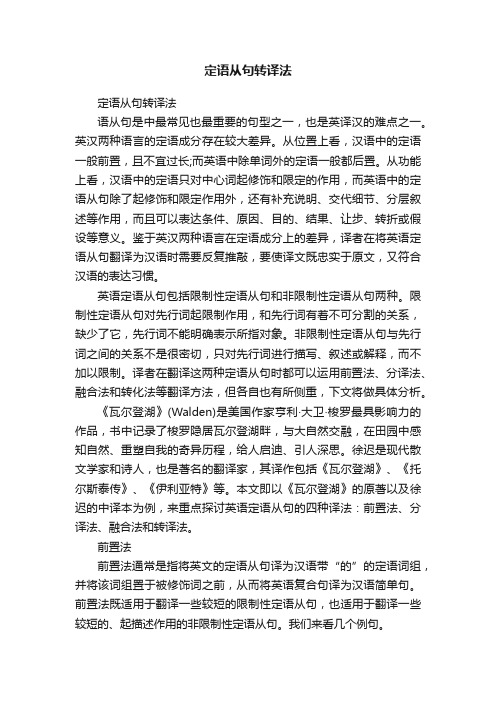
定语从句转译法定语从句转译法语从句是中最常见也最重要的句型之一,也是英译汉的难点之一。
英汉两种语言的定语成分存在较大差异。
从位置上看,汉语中的定语一般前置,且不宜过长;而英语中除单词外的定语一般都后置。
从功能上看,汉语中的定语只对中心词起修饰和限定的作用,而英语中的定语从句除了起修饰和限定作用外,还有补充说明、交代细节、分层叙述等作用,而且可以表达条件、原因、目的、结果、让步、转折或假设等意义。
鉴于英汉两种语言在定语成分上的差异,译者在将英语定语从句翻译为汉语时需要反复推敲,要使译文既忠实于原文,又符合汉语的表达习惯。
英语定语从句包括限制性定语从句和非限制性定语从句两种。
限制性定语从句对先行词起限制作用,和先行词有着不可分割的关系,缺少了它,先行词不能明确表示所指对象。
非限制性定语从句与先行词之间的关系不是很密切,只对先行词进行描写、叙述或解释,而不加以限制。
译者在翻译这两种定语从句时都可以运用前置法、分译法、融合法和转化法等翻译方法,但各自也有所侧重,下文将做具体分析。
《瓦尔登湖》(Walden)是美国作家亨利·大卫·梭罗最具影响力的作品,书中记录了梭罗隐居瓦尔登湖畔,与大自然交融,在田园中感知自然、重塑自我的奇异历程,给人启迪、引人深思。
徐迟是现代散文学家和诗人,也是著名的翻译家,其译作包括《瓦尔登湖》、《托尔斯泰传》、《伊利亚特》等。
本文即以《瓦尔登湖》的原著以及徐迟的中译本为例,来重点探讨英语定语从句的四种译法:前置法、分译法、融合法和转译法。
前置法前置法通常是指将英文的定语从句译为汉语带“的”的定语词组,并将该词组置于被修饰词之前,从而将英语复合句译为汉语简单句。
前置法既适用于翻译一些较短的限制性定语从句,也适用于翻译一些较短的、起描述作用的非限制性定语从句。
我们来看几个例句。
例1:When I wrote the following pages, or rather the bulk of them,I lived alone,in the woods, a mile from any neighbor, in a house which I had built myself, on the shore of Walden Pond,in Concord,Massachusetts,and earned my living by the labor of my hands only.译文当我写后面那些篇页,或者后面那一大堆文字的时候,我是在孤独地生活着,在森林中,在马萨诸塞州的康科德城,瓦尔登湖的湖岸上,在我亲手建筑的木屋里,距离任何邻居一英里,只靠着我双手劳动,养活我自己。
将定语从句转换为简单句

将定语从句转换为简单句man who you’re talking to is my friend.need a pen with which I can write a letter.man (whom) I talked about at the meeting is from Beijing University.live in a house far away from the city, in front of which is a big tree.engineer, whose leg was badly hurt, was quickly sent to hospital.you know the gentleman who/that is sitting thereman (whom ) I spoke with is my teacher.is the right girl (whom) we are looking for.house which/that was destroyed in the earthquake is weak.games (that/which) the young men competed in were difficult.11. I still remember the time when I joined the League.still remember the school in which=where I joined the League.is the factory (which/that) he visited yesterday.reason why(for which) he was late is that he missed the bus.is the reason (that/ which) he gave/ explained to us.will never forget the day (which/that) I spent in Hongkong.will never forget the day when/on which Hongkong returned to its motherland.reason (that/which)he gave for not coming to school yesterday isn’t believable.is the best film that has been shown this year.is the first book (that) I borrow from the library.is the first student that/who came to school today.talked about the teachers and the school (that) he had visited.that I want to say to you is “Thank you”.’ll tell you anything (that) I know.is one of the books (that) I’m very intis the only book (that) I read.is the only one of the boys that likes playing the piano.the glasses that were on the table fell off onto the floor.likes the girl(充当表语) that she used to be.room in which he lives is very large.house, which I visited yesterday,is very large.。
in which定语从句改写回
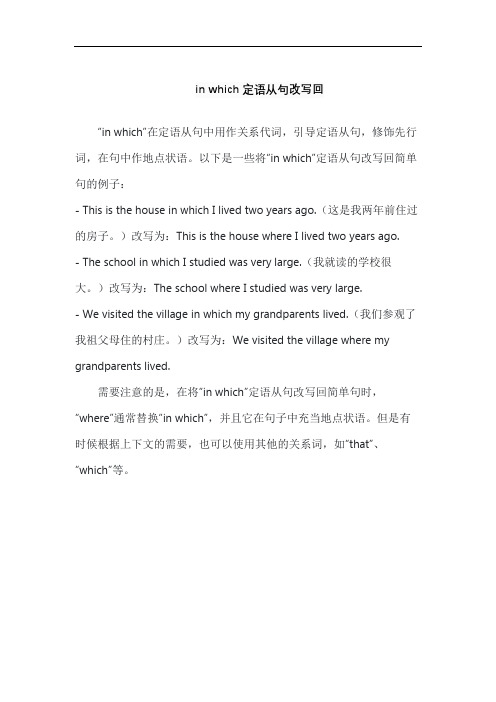
in which定语从句改写回
“in which”在定语从句中用作关系代词,引导定语从句,修饰先行词,在句中作地点状语。
以下是一些将“in which”定语从句改写回简单句的例子:
- This is the house in which I lived two years ago.(这是我两年前住过的房子。
)改写为:This is the house where I lived two years ago. - The school in which I studied was very large.(我就读的学校很大。
)改写为:The school where I studied was very large.
- We visited the village in which my grandparents lived.(我们参观了我祖父母住的村庄。
)改写为:We visited the village where my grandparents lived.
需要注意的是,在将“in which”定语从句改写回简单句时,“where”通常替换“in which”,并且它在句子中充当地点状语。
但是有时候根据上下文的需要,也可以使用其他的关系词,如“that”、“which”等。
复合句改为简单句
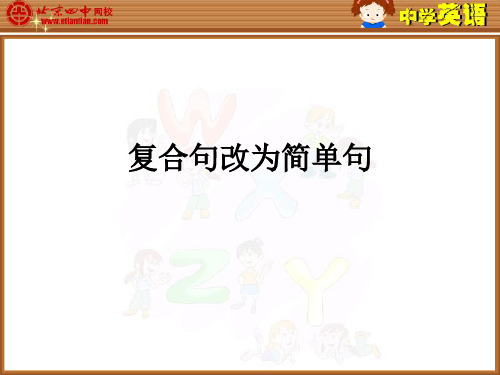
三、将定语从句变为简单句 (提高部分)
1)当定语从句是主动语态并且用的是进行时态时, 可将定语从句改为现在分词短语;当定语从句中 的谓语动词是表示经常性的动作时,可将定语从 句改为现在分词短语。如: The man who is talking with Mary is my brother. talking with →The man _____ _____Mary is my brother. A chemist’s shop is a shop which sells medicine. medicine →A chemist’s shop is a shop selling _____ _____.
2) 含有so …that …引导的结果状语从句(肯定)的复合句 用“…enough +不定式”结构可以将变为简单句。例如: 1. The girl is so tall that she can reach the apples on the tree. tall enough to reach →The girl is _____ _____ _____ _____the apples on the tree. 2.This hall is so large that it can hold 2000 people. to _____ hold 2000 people. →This hall is large enough _____ _____ 3. The table was so light that the little boy can carry it. light _____ enough for the little boy _____ →The table was _____ _____ to carry.
复合句与简单句的转换技巧

复合句与简单句的转换技巧一、含宾语从句的复合句转换为简单句即将宾语从句转换成相应的短语。
如:We expected that you would come. 我们希望你来。
→We expected you to come. 我们希望你来。
Now tell me what I should do. 现在告诉我该怎么办。
→Now tell me what to do. 现在告诉我该怎么办。
I remember I once met her at a party. 我记得在一次晚会上见过他。
→I remember once meeting her at a party. 我记得在一次晚会上见过他。
I ask him what I shall do. 我问他该怎么办。
→I ask him what to do. 我问他该怎么办。
I can’t decide whom I shou ld invite. 我不能决定该邀请谁。
→I can’t decide whom to invite. 我不能决定该邀请谁。
二、含状语从句的复合句转换成简单句即将状语从句转换成状语短语。
如:He can’t come because he is ill. 他因病不能来。
→He can’t come because of his illness. 他因病不能来。
Turn off the light before you leave. 离开前请关灯。
→Turn off the light before leaving. 离开前请关灯。
He went home after he finished his work. 他做完工作后就回家了。
→He went home after finishing his work. 他做完工作后就回家了。
He was so angry that h e couldn’t speak. 他气得话都说不出来。
定语从句改写为简单句

(一)改用“不定式〞或“不定式短语〞如果定语从句的时态与主句的时态具有同时性(包括谓语有情态动词)或之后性,那么可以用“关系代词或关系副词+不定式〞来简化,或直接用“不定式〞来修饰先行词。
要注意的是,此时的不定式一定要是及物动词,如果是不及物,那么需要在动词后面加上相应的介词,使之成为及物动词短语。
这个结尾的介词可以提前到关系代词前面,也可以继续留在句尾。
前者是正式说法,后者是非正式说法。
例1:We moved to the country so that the children would have a garden in which they could play in.我们搬到了乡下,好让孩子们有个花园在里面玩。
改为:We moved to the country so that the children would have a garden in which to play.或者:We moved to the country so that the children would have a garden to play in.例2:He felt miserable unless he had neighbors (whom)he could quarrel with.他要是没有可以吵架的邻居就难受。
改为:He felt miserable unless he had neighbors with whom to quarrel.或者:He felt miserable unless he had neighbors to quarrel with.例3: The conference which will be held this afternoon is bound to be a great success. 方案在今天下午举行的会议一定会取得成功。
改为:The conference which to be held this afternoon is bound to be a great success.或者:The conference to be held this afternoon is bound to be a great success.12月29日,美国邮政总局局长约翰·E·波特在檀香山从句了农历新年的纪念邮票小型张的揭幕仪式,这枚小型张将于2005年正式发行,它为农历新年的系列纪念邮票写下了完美的结局。
将下列带定语从句的主从复合句变为简单句
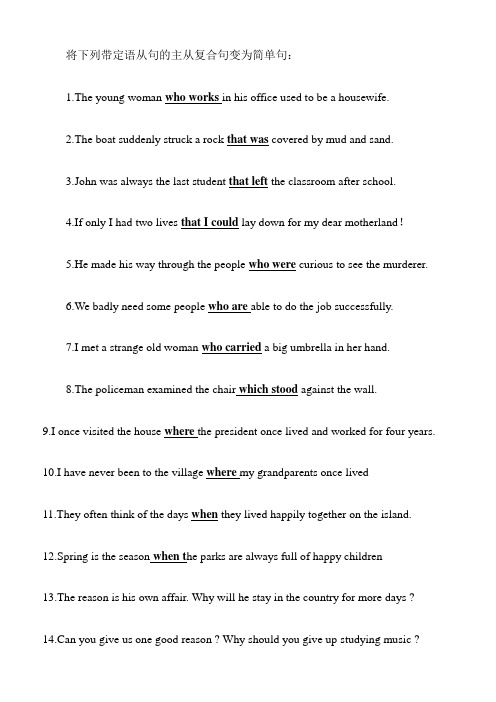
将下列带定语从句的主从复合句变为简单句:1.The young woman who works in his office used to be a housewife.2.The boat suddenly struck a rock that was covered by mud and sand.3.John was always the last student that left the classroom after school.4.If only I had two lives that I could lay down for my dear motherland!5.He made his way through the people who were curious to see the murderer.6.We badly need some people who are able to do the job successfully.7.I met a strange old woman who carried a big umbrella in her hand.8.The policeman examined the chair which stood against the wall.9.I once visited the house where the president once lived and worked for four years.10.I have never been to the village where my grandparents once lived11.They often think of the days when they lived happily together on the island.12.Spring is the season when t he parks are always full of happy children13.The reason is his own affair. Why will he stay in the country for more days ?14.Can you give us one good reason ? Why should you give up studying music ?1.The young woman working in his office used to be a housewife.2.The boat suddenly struck a rock covered by mud and sand.3.John was always the last student to leave the classroom after school.4.If only I had two lives to lay down for my dear motherland!5.He made his way through the people curious to see the murderer.6.We badly need some people able to do the job successfully.7.I met a strange old womanwith a big umbrella in her hand.8.The policeman examined the chair against the wall.9.I once visited the house . The president once lived and worked in the house for four years. 10.I have never been to the village. My grandparents once lived in the village.11.They often think of the days. They lived happily together on the island in those days.12.Spring is the season. The parks are always full of happy children in the season.13.The reason why he will stayin the country for more daysis his own affair.14. Can you give us one good reason why you should give up studying music ?。
仁爱中考定语定语从句
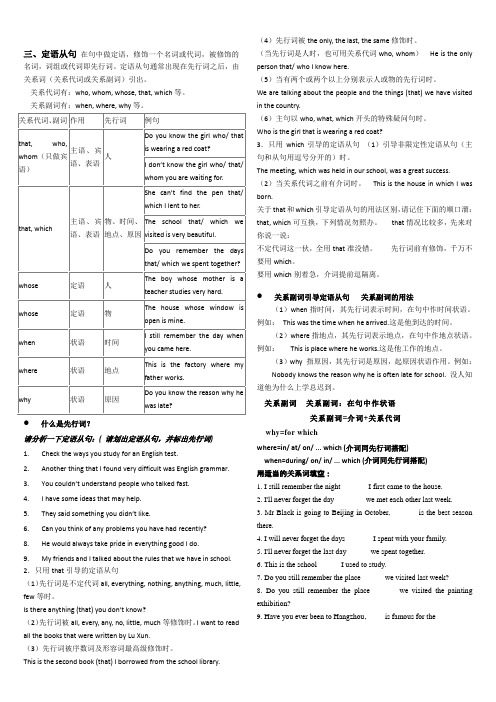
三、定语从句在句中做定语,修饰一个名词或代词,被修饰的名词,词组或代词即先行词。
定语从句通常出现在先行词之后,由关系词(关系代词或关系副词)引出。
关系代词有:who, whom, whose, that, which等。
关系副词有:when, where, why等。
●什么是先行词?请分析一下定语从句:( 请划出定语从句,并标出先行词)1. Check the ways you study for an English test.2. Another thing that I found very difficult was English grammar.3. You couldn’t understand people who talked fast.4. I have some ideas that may help.5. They said something you didn’t like.6. Can you think of any problems you have had recently?8. He would always take pride in everything good I do.9. My friends and I talked about the rules that we have in school. 2.只用that引导的定语从句(1)先行词是不定代词all, everything, nothing, anything, much, little, few等时。
Is there anything (that) you don’t know?(2)先行词被all, every, any, no, little, much等修饰时。
I want to read all the books that were written by Lu Xun.(3)先行词被序数词及形容词最高级修饰时。
初中英语复杂句变简单句单项选择题70题

初中英语复杂句变简单句单项选择题70题1. The book that I bought yesterday is very interesting. Which of the following is the simple sentence?A. I bought a book yesterday.B. The book is very interesting.C. I bought an interesting book.D. Yesterday I bought a book.答案:B,本题考查定语从句变简单句。
原句“The book that I bought yesterday is very interesting.”中“that I bought yesterday”是定语从句,修饰先行词“the book”,去掉定语从句后,简单句为“The book is very interesting.”2. I don't know what he is doing. Which one is the simple sentence?A. I don't know.B. He is doing something.C. I don't know something.D. What he is doing.答案:A,本题涉及宾语从句变简单句。
原句“I don't know what he is doing.”中“what he is doing”是宾语从句,去掉宾语从句后,简单句为“I don't know.”3. The man who is standing there is my teacher. What is the simple sentence?A. The man is my teacher.B. The man is standing there.C. My teacher is standing there.D. Who is standing there.答案:A,原句“The man who is standing there is my teacher.”中“who is standing there”是定语从句,去掉后简单句为“The man is my teacher.”4. She told me where she lived. Which is the simple sentence?A. She told me.B. Where she lived.C. She lived somewhere.D. She lived.答案:D,原句“She told me where she lived.”中“where she lived”是宾语从句,去掉后简单句为“She lived.”5. The dress which she wore yesterday was beautiful. What is the simple sentence?A. The dress was beautiful.B. She wore a dress yesterday.C. She wore the dress.D. Yesterday was beautiful.答案:A,原句“The dress which she wore yesterday was beautiful.”中“which she wore yesterday”是定语从句,去掉后简单句为“The dress was beautiful.”6. Do you know how he came here? Which is the simple sentence?A. Do you know?B. How he came here.C. He came here.D. I don't know.答案:A,原句“Do you know how he came here?”中“how he came here”是宾语从句,去掉后简单句为“Do you know?”7. The bike that my father bought for me is broken. What's the simple sentence?A. The bike is broken.B. My father bought a bike.C. The bike is for me.D. My father bought me a bike.答案:A,原句“The bike that my father bought for me is broken.”中“that my father bought for me”是定语从句,去掉后简单句为“The bike is broken.”8. I can't understand what you said. Which one is the simple sentence?A. I can't understand.B. What you said.C. You said something.D. I understand.答案:A,原句“I can't understand what you said.”中“what you said”是宾语从句,去掉后简单句为“I can't understand.”9. The girl whose mother is a doctor is my classmate. What is the simple sentence?A. The girl is my classmate.B. The girl's mother is a doctor.C. My classmate's mother is a doctor.D. Whose mother is a doctor.答案:A,原句“The girl whose mother is a doctor is my classmate.”中“whose mother is a doctor”是定语从句,去掉后简单句为“The girl is my classmate.”10. Could you tell me where the library is? Which is the simple sentence?A. Could you tell me?B. Where the library is.C. The library is somewhere.D. I don't know.答案:A,原句“Could you tell me where the library is?”中“where the library is”是宾语从句,去掉后简单句为“Could you tell me?”11. The man who is standing over there is my father.A. The man is my father.B. The man standing over there is my father.C. The man is standing over there my father.D. The man who standing over there is my father.答案:B,原句是一个定语从句,“who is standing over there”修饰先行词“the man”,将其变为简单句时,去掉定语从句,保留“standing over there”作后置定语修饰“the man”。
英语从句翻译技巧

英语从句翻译技巧一、前置法当一个限定性定语从句结构和意义较为简单,或是较为简短时,我们把英语原文的定语从句翻译成带"的'的定语词组,放置于被修饰的词之前,将英语原文的复合句翻译成汉语的简单句。
二、单独成句当一个限定性定语从句的结构较为复杂,意义较为繁杂的时候,如果把它翻译在其修饰的先行词的后面的话,会显得定语太过于臃肿和复杂,而无法让评卷老师看的清清楚楚,明明白白。
所以这个时候我们要把定语从句单独翻译出来,放置于原来它所修饰的词的后面当定语。
同时当定语从句是一个非限定性定语从句的时候,往往也要单独成句。
三、融合法把主句和定语从句融合成一个简单句,定语从句译成谓语。
这种方法一般用于限制性定语从句,尤其是"there be'句型中。
There is a girl downstairswho wants to see you.楼下有人要见你。
There are many people whoare interested in the new invention.很多人对这项发明感兴趣。
这种定语从句在已经考过的试卷中还没有出现,所以,大家先掌握了具体的方法就好了!四、状译法英语中有些定语从句,不仅仅起到一个定语修饰的作用,而且在逻辑上(即意义上)与主句有状语关系,表示原因、让步、转折等等关系。
所以广大考生在翻译的时候,应尽量从英语句子的意义上发现这些逻辑上的关系,然后翻译成汉语中相对应的逻辑关系来。
2英语翻译学习技巧一. 翻译的技巧没有技巧,只有一个熟字。
华罗庚说过,"苦干猛干埋头干,熟能生出百巧来'。
语法根基深厚,词汇量大,对专业词汇掌握得熟,自然就能驾轻就熟,怎么玩儿怎么转。
简单地说,基本功扎实就是技巧。
二. 翻译中最重要的项目语法、词汇和专业知识。
语法是最重要的,初中和高中学到的核心的东西其实就是语法。
如果语法不好,和老外交流可能会很顺畅,但是做翻译不行,翻译不仅要求能让读者明白意思,而且要专业,英孚英语这个必不可少。
复合句与简单句的转换技巧

复合句与简单句的转换技巧————————————————————————————————作者:————————————————————————————————日期:复合句与简单句的转换技巧一、含宾语从句的复合句转换为简单句即将宾语从句转换成相应的短语。
如:We expected thatyou would come.我们希望你来。
→Weexpected you to come. 我们希望你来。
Now tellme what Ishould do. 现在告诉我该怎么办。
→Now tell me what todo.现在告诉我该怎么办。
I remember I once met her ata party.我记得在一次晚会上见过他。
→Iremember once meetingher ataparty. 我记得在一次晚会上见过他。
I ask himwhat I shall do. 我问他该怎么办。
→I ask him whatto do.我问他该怎么办。
I can’tdecide whom I should invite.我不能决定该邀请谁。
→Ican’t decide whomtoinvite.我不能决定该邀请谁。
二、含状语从句的复合句转换成简单句即将状语从句转换成状语短语。
如:He can’tcome becauseheis ill. 他因病不能来。
→He can’tcome because of hisillness. 他因病不能来。
Turn off the light before you leave.离开前请关灯。
→Turn off thelightbefore leaving. 离开前请关灯。
He went home afterhefinished his work.他做完工作后就回家了。
→Hewenthomeafter finishing his work. 他做完工作后就回家了。
He wasso angry thathecouldn’t speak.他气得话都说不出来。
定语从句的两种翻译方法
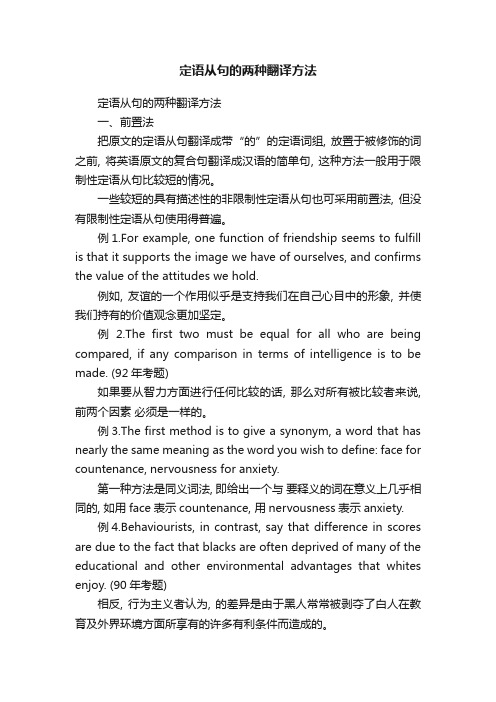
定语从句的两种翻译方法定语从句的两种翻译方法一、前置法把原文的定语从句翻译成带“的”的定语词组, 放置于被修饰的词之前, 将英语原文的复合句翻译成汉语的简单句, 这种方法一般用于限制性定语从句比较短的情况。
一些较短的具有描述性的非限制性定语从句也可采用前置法, 但没有限制性定语从句使用得普遍。
例1.For example, one function of friendship seems to fulfill is that it supports the image we have of ourselves, and confirms the value of the attitudes we hold.例如, 友谊的一个作用似乎是支持我们在自己心目中的形象, 并使我们持有的价值观念更加坚定。
例2.The first two must be equal for all who are being compared, if any comparison in terms of intelligence is to be made. (92年考题)如果要从智力方面进行任何比较的话, 那么对所有被比较者来说, 前两个因素必须是一样的。
例3.The first method is to give a synonym, a word that has nearly the same meaning as the word you wish to define: face for countenance, nervousness for anxiety.第一种方法是同义词法, 即给出一个与要释义的词在意义上几乎相同的, 如用face表示countenance, 用nervousness表示anxiety.例4.Behaviourists, in contrast, say that difference in scores are due to the fact that blacks are often deprived of many of the educational and other environmental advantages that whites enjoy. (90年考题)相反, 行为主义者认为, 的差异是由于黑人常常被剥夺了白人在教育及外界环境方面所享有的许多有利条件而造成的。
英语从句的“简化”

英语从句的“简化”摘要:本文通过展示各种状语从句、定语从句和名词性从句的不同简化方式,试图探索英语从句简化的内在规律。
关键词:英语从句;简化;省略“删繁就简”是当今语言发展的趋势之一,“当代英语的用词越来越通俗,句子越来越短小,这是一个明显的趋势。
”英语从句的“简化”可以看作是这一趋势的一种具体表现。
所谓英语从句的“简化”,就是通过对部分成分的省略或替代,把从句“简化”为分词短语、不定式短语或介词短语等,从而使一些复合句变得短小精悍或化为简单句。
本文拟对这一现象进行初步的探讨。
一、状语从句的“简化”我们先来看一些状语从句“简化”的例子:例1. Be careful when you are crossing the busy street. (时间状语从句)Be careful when crossing the busy street.例2. I will not attend the party unless I am invited. (条件状语从句)I won’t a ttend the party unless invited.例3. He returned three days earlier than he was expected. (比较状语从句)He returned three days earlier than expected.例4. Though they had failed several times(让步状语从句), they never lost heart. Though having failed several times, they never lost heart.例5. Although he was a physicist by training(让步状语从句), he became a great statesman.Although a physicist by training, he became a great statesman.一般来说,在时间、条件和让步等状语从句中,如果从句的主语与主句的主语一致,并且从句谓语中含有be动词时,我们可以用省略从句主语和be动词的方式把这些从句“简化”为相应的“从属连词+分词(或形容词、名词、介词)短语”这种结构。
定语从句的翻译方法与技巧

但密格尔的富有感染力的笑声打破了静默。
前置法
(二) 后置法
当定语从句较长时, 如果翻译成前置的定语, 就会不符合汉语的表达习惯, 在这种情况下, 往往把该定语从句翻译成并列的分句, 放置于原来它所修饰词的后面。翻译时可以用三种方法来处理。 译成并列分句,重复先行词 译成并列分句,省略先行词 译成独立句(非限制性定从)
05
液态水变为蒸汽,这就叫做蒸发
定语从句的译法
前置法
后置法
融合法
译成状语
把英语原文的定语从句翻译成带“的”的定语词组, 放置于被修饰的词之前, 将英语原文的复合句翻译成汉语的简单句, 这种方法一般用于限制性定语从句比较短的情况。
01
一些较短的具有描述性的非限制性定语从句也可采用前置法, 但没有限制性定语从句使用得普遍。
He had talked to Vice-President Nixon, who assured him that everything that could be done would be done. One was a violent thunderstorm, the worst I had ever seen, which obscured my objective. 他和副总统尼克松谈过话。副总统向他担保,凡是能够做到的都将竭尽全力去做。 有一次是暴风骤雨,猛烈的程度实为我生平仅所见。这阵暴风雨遮住了我的目标。
他看见前面那个憔悴的白发老人,眼睛里愤怒地闪着红光。
It is he who received the letter that announced the death of your uncle. He saw in front that haggard white-haired old man, whose eyes flashed red with fury.
中考英语复习之复合句改为简单句(可编辑)

复合句改为简单句复合句改为简单句一、将宾语从句变为简单句一、将宾语从句变为简单句1 用“及物动词+ 不定式”结构可以将含有that 引导的某些宾语从句的复合句转换成简单句。
例如:1. He decided that he would buy a digitalcamera online.to buy→He decided_____ _____ a digital cameraonline.2. We hoped that we would come back soon.to come→We hoped _____ _____ back soon.3. I expect that I shall finish my work by thisSunday.to finish→I expect _____ _____my work by this Sunday.2 用“疑问词+ 不定式“结构可以将某些含有连接代词或连接副词引导的宾语从句转换简单句。
例如:1.I don’t know which one I can buywhichone to buy→I don’t know _____ _____ _____ _____.2.We wonder where we’ll go this Sunday.where to go→We wonder _____ _____ _____ this Sunday.3.Could you please teach me how I can searchthe Internet?howto→Could you please teach me _____ __________ the Internet?search3 用复合宾语 , 即" 主语+ 谓语+ 宾语+ 宾补" 这种结构语改写。
如 :I saw he went into that house just now .go intohim→ I saw _____ _____ _____ that housejust now .I heard she was singing in English .→ I heard _h _e _r_ _ s i_ n_ g _i_ n_ g in English .4 用名词或名词短语改写。
定语从句整合简单句
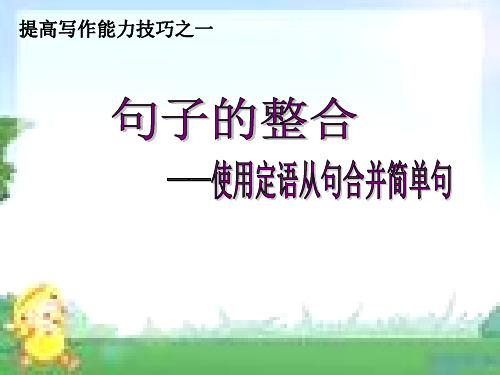
The man is our headmaster. You shook hands with the man just now.
The man with whom you shook hands just now is our headmaster.
I saw a boy and his dog.
The girl is wearing a white hat.
The girl is Li Shan’s sister.
The girl who/that is wearing a white hat is Li Shan’s sister.
I have a good friend. My good friend is medium height.
The school is very nice. We are studying in this school.
The school where we are studying is very nice.
3. 保护野生动物 The animal is endangered. We should protect the animal. We should protect the animal that is endangered.
提高写作能力技巧之一
Example: The factory is very famous. We visited the factory yesterday.
The factory which we visited yesterday is very famous.
1. 描述人物 The man is Mr. White. The man is playing the trumpet . The man who/that is playing the trumpet is Mr. White.
五年级必考“句式转换题”方法总结与练习

五年级必考“句式转换题”方法总结与练习五年级的句式转换题是语文考试中常见的考点之一,也是学生们普遍感到头疼的一部分。
在学习和解答这类题目时,我们需要掌握一些方法和技巧,下面将总结五年级必考的句式转换题方法,并附上一些练习题。
一、句式转换的基本技巧1. 主谓宾句转换为被动语态在转换为被动语态时,主语变为动作的承受者,原谓语动词变为被动语态的谓语动词,宾语变为主动语态的主语。
例如:主动语态:他打了我一拳。
被动语态:我被他打了一拳。
2. 定语从句转换为简单句在转换定语从句时,需要先确定定语从句的先行词,然后将定语从句中的关系词和关系代词去掉,保留其他成分,形成简单句。
例如:定语从句:这是我买的房子。
简单句:这是我买的。
3. 并列句转换为复合句在转换并列句时,需要确定主句和从句的关系,根据连接词的不同,可以转换为主从复合句或者介词短语。
例如:并列句:我喜欢唱歌,他喜欢跳舞。
主从复合句:我喜欢唱歌,因为他喜欢跳舞。
介词短语:我喜欢唱歌,在他喜欢跳舞的时候。
二、句式转换练习1. 将下列句子改写为被动语态。
他们打掉了那个篮球。
答:那个篮球被他们打掉了。
2. 将下列定语从句改写为简单句。
这是我刚买的新书。
答:这是我刚买的。
3. 将下列并列句改写为主从复合句。
小明喜欢玩游戏,他每天都玩。
答:小明喜欢玩游戏,因为他每天都玩。
4. 将下列句子改写为介词短语。
他们在山上看到了很多野花。
答:他们在看到很多野花的山上。
5. 将下列句子改写为反意疑问句。
你是老师吧,对不对?答:你是老师吧,是吗?6. 将下列句子改写为感叹句。
这个小女孩太可爱了!答:太可爱了,这个小女孩!7. 将下列句子改写为同义句。
我们正在上英语课。
答:我们正在进行英语课。
以上是五年级必考的句式转换题的方法总结与练习,希望对你有帮助。
在实际解答题目时,还需多加练习和熟练应用,加深对句式转换的理解和掌握。
成功地解答这类题目,需要我们对语法知识的掌握和对语文学科的理解能力,所以要保持勤奋学习,不断提高。
- 1、下载文档前请自行甄别文档内容的完整性,平台不提供额外的编辑、内容补充、找答案等附加服务。
- 2、"仅部分预览"的文档,不可在线预览部分如存在完整性等问题,可反馈申请退款(可完整预览的文档不适用该条件!)。
- 3、如文档侵犯您的权益,请联系客服反馈,我们会尽快为您处理(人工客服工作时间:9:00-18:30)。
将定语从句转换为简单句
man who you’re talking to is my friend.
need a pen with which I can write a letter.
man (whom) I talked about at the meeting is from Beijing University. live in a house far away from the city,in front of which is a big tree. engineer,whose leg was badly hurt,was quickly sent to hospital. you know the gentleman who/that is sitting there
man (whom ) I spoke with is my teacher.
is the right girl (whom) we are looking for.
house which/that was destroyed in the earthquake is weak.
games (that/which) the young men competed in were difficult.
11.I still remember the time when I joined the League.
still remember the school in which=where I joined the League.
is the factory (which/that) he visited yesterday.
reason why(for which) he was late is that he missed the bus.
is the reason (that/ which) he gave/ explained to us.
will never forget the day (which/that) I spent in Hongkong.
will never forget the day when/on which Hongkong returned to its motherland.
reason (that/which)he gave for not coming to school yesterday isn’t believable.
is the best film that has been shown this year.
is the first book (that) I borrow from the library.
is the first student that/who came to school today.
talked about the teachers and the school (that) he had visited.
that I want to say to you is “Thank you”.
’ll tell you anything (that) I know.
is one of the books (that) I’m very int
is the only book (that) I read.
is the only one of the boys that likes playing the piano.
the glasses that were on the table fell off onto the floor.
likes the girl(充当表语)that she used to be. room in which he lives is very large.
house,which I visited yesterday,is very large.。
